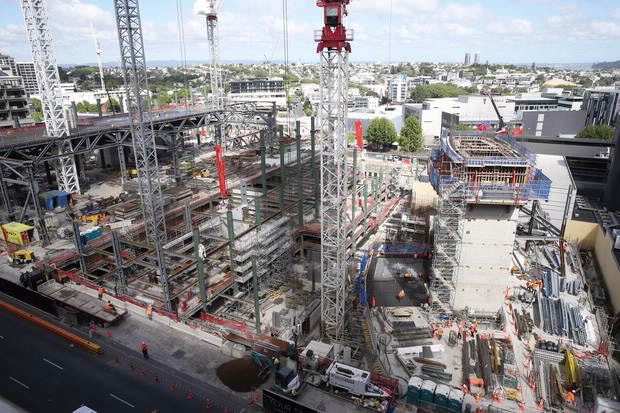New Zealand's $1 trillion real estate sector could enjoy a shot in the arm from a big infrastructure push and consenting reform by the Government in 2018, an industry boss hopes.
Connal Townsend, chief executive of the Property Council, has high hopes for the new system.
"There will be a lot of focus by the Government to drive infrastructure hard and to improve the consenting process in both building and resource consenting," said Townsend
The Property Council has 730 members, who control about $50 billion of assets.
Start your property search
"There will be a major effort by the private sector and the Government, looking at the planning system and building consents, a lot of talking and deep thinking about the fact that local authorities need to be risk-averse," he said.

Townsend, who said property contributed $83.4b annually to New Zealand's gross domestic product, believed the economy would get a boost from the sector in 2018.
He wasn't so sure that there would be strong capital growth and said there has been slight value declines in property over the last six months.
"I dispute whether there will be strong capital growth. There will be growth - the industry is still doing quite well," he said.
John Polkinghorne, an associate director of Parnell based retailing and property consultants RCG, said the construction sector was at record levels, with 170,000 people working in it.
"So there are real challenges to scaling up any further. The focus has to be on boosting productivity," he said.
"At least one major Auckland shopping mall expansion will get underway, although it won't open until 2019. Clear regional differences will emerge in 2018: Christchurch has overshot and could end up with an oversupply of housing, while shortages remain in many other cities and will take years to correct in Auckland," Polkinghorne said.

Real estate firm Colliers International's top predictions for 2018
New Zealand investment groups will dominate rural property purchases.
"Overseas buyers will chase urban assets instead, mostly due to the attractive returns, but also partly due to Overseas Investment Act restrictions on rural land purchases of 5ha or more," Colliers' forecast said.
Extra office supply in Auckland and Wellington won't dent strong capital value and rental increases. "Syndicators and overseas funds will continue to be the dominant buyers of substantial city centre properties, as domestic institutions find it hard to justify buying at current price levels."
The high level of confidence shown by industrial property investors in 2017 will prove to be justified. "Investors can expect more rental rises and steady (already very low) yields, particularly in the main centres," Colliers said.
Increasing online retail activity will boost demand for warehousing from retail logistics providers. "This will be aided by continuing low fuel prices. In Auckland, a regional fuel tax will concentrate demand close to arterial roads," the agency said.
Increasing staff costs and lower immigration will begin to prey on the minds of retailers. "This will particularly affect those in the food and beverage sector. However, the lag effect of these measures and continued positive consumer confidence will defer any negative effects beyond 2018, while robust tourism growth will counteract these effects in tourist hotspots," Colliers said.

In a year, the national median house price will be higher than it is now. "Downside protection will be provided by base demand, which remains robust, low interest rates and, at the margins, easing of loan to value restrictions."
Off-the-plan residential sales will get a boost.
"Concentrating overseas buyers on new homes, plus a bit of Government buying, will begin to boost 'off the plan' sales, allowing supply in the following years to increase."
The official cash rate won't go up until late 2018 at the earliest. "A shortage of quality stock for sale in a high demand environment will be a more powerful influence than marginally higher."
Government efforts to increase skilled labour for the construction industry will be constrained. "Other Government policies, such as free tertiary education for a year, and reduced immigration will impact plans to train or import more labour. Construction cost inflation isn't going to go away in the short term," it said.


















































































